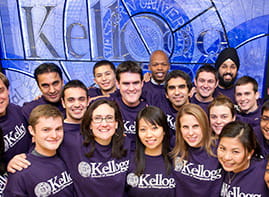Learning the hard way
‘Shark Tank’ contestants Brian Duggan ’05 and Jonathan Miller ’08 share their hard-won lessons on entrepreneurship with students on Kellogg’s downtown campus
By Rachel Farrell2/4/2010 - Launching your own business is hard. And taking that business before a panel of investors on national TV is even harder.
But Brian Duggan ’05 and Jonathan Miller ’08 accomplished both those feats — and became wiser, savvier business owners in the process. Duggan, a graduate of the Part-Time Program, is the co-founder of Jump Forward, a company that offers Web and mobile devices to connect athletes with coaches; Miller, a Full-Time Program graduate, is the founder of Element Bars, a company that produces customized energy bars. Both appeared as contestants on the ABC-TV reality show “Shark Tank” and walked away with offers from investors worth six figures.
Duggan and Miller visited Wieboldt Hall, home of the Kellogg School’s Part-Time Program, in downtown Chicago on Feb. 1 to share the lessons they learned from these experiences with Kellogg students, alumni, staff and friends.
Be the best at what you do
Invest enough in your product to make it superior to what your competitors are offering, said Duggan, adding that he’s already invested $1 million in Jump Forward. “If you play in technology, make sure you’re the best on the market,” he said. “Take your technology budget, and then double or triple it.” Rather than get discouraged by competition from You Bar, a Los Angeles-based company with a concept similar to Element Bar, Miller focused on being better in every area of the business. “You’re never the first one with an idea,” Miller said. “It’s all about execution.”
Stick to your core business
Smart growth is better than fast growth. Duggan says he’s received several tempting offers from investors and potential partners, but he’s had to turn down those that deflect from his core business. “You need to stay focused,” he said. “If it’s not core to your mission, you have to put it aside, or you will never capitalize on true opportunities.”
Partner wisely
It’s important to partner with individuals who “complement your weaknesses,” said Miller, who joined forces with a nutritionist who balanced his technology background. Duggan also encouraged students to partner with people who don’t have an MBA because they can sometimes bring a fresh perspective. “The most important thing that I’ve learned is to diversify your network and partner wisely,” he said.
Be prepared to bootstrap
When financing your business, don’t depend too much on investors. Those who hold too large a share can take control of your business and turn into a supervisor of sorts. “At the end of the day, you’re not going into business for someone else,” said Duggan. “There’s no point in giving up your business from the start.”
Network, network, network
Duggan estimates that 90 percent of the “good things that have happened” at Jump Forward have resulted from connections he has made through the Kellogg alumni network. “If you have a good idea, tell everyone you know about it,” says Duggan. “What will come out of it are good relationships and good referrals.”
Do-it-yourself
To truly know your business, you have to get your hands dirty. Miller once spent eight hours and 29 minutes packaging 1,700 Element Bars by hand. “After I did it, I knew what the problems were [with packaging the bars] and I knew we needed to get faster,” he said. “Sometimes you just got to do it yourself to do it right.”
Follow your passion — not money
Duggan has invested huge amounts of his own money — and even cashed out his 401K — to get Jump Start running, and the business is not yet cash-flow-positive. What keeps him motivated is his passion for the business, not the pursuit of cash. “It’s an emotional strain,” Duggan said. “You say, is this worth it? [Professor] Barry Merkin pounded into our head, ‘Don’t do it for the money,’ because it’s not worth it. The emotional and physical stresses are not worth it.” Miller agrees. “I love what I do,” he says. “If you find something that drives you, then do it.”
The event, “Swimming with the Sharks,” was presented by the Kellogg Symposium on Managerial Leadership and the Kellogg Alumni Club of Chicago.






